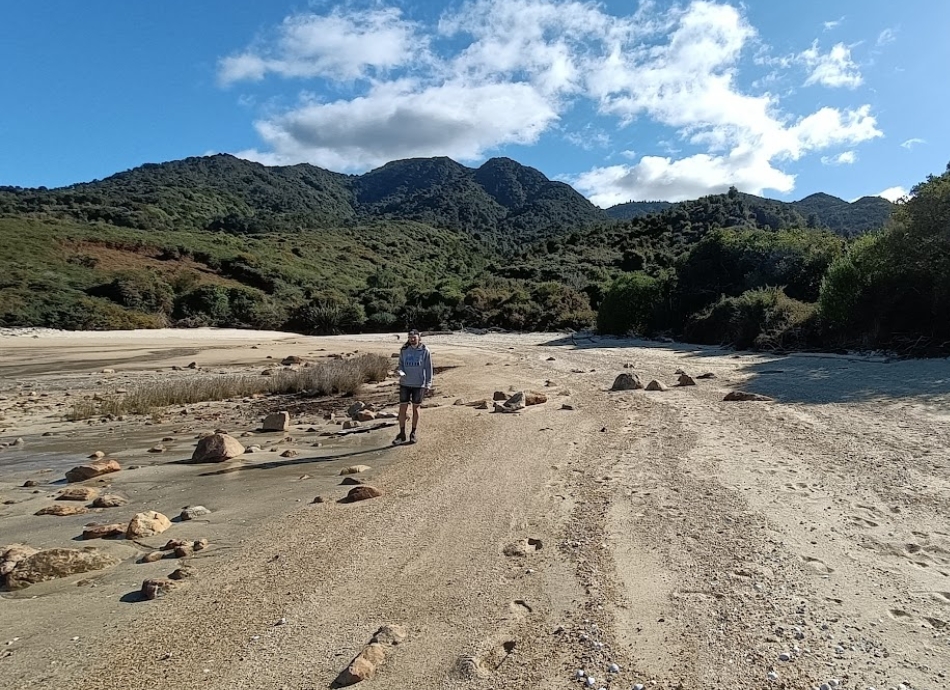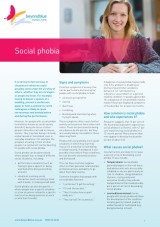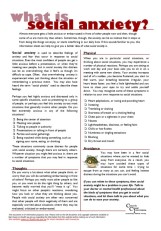Social anxiety disorder
Also known as social phobia
Key points about social anxiety disorder
- Social anxiety disorder is a persistent fear of social situations largely because you think others might be judging you negatively.
- It can cause you to avoid social situations and can affect your everyday activities, self-confidence and relationships.
- Most people with social anxiety know that it's not rational, but they feel they can't control their fear.
- There are things you can do to feel less anxious and there are resources and people who can help you.

It’s common for most of us to have occasional moments where social situations can feel a bit daunting, but someone with social anxiety disorder experiences strong anxiety or panic in most social situations because of a fear of being watched and judged by others.
Social anxiety disorder is also known as social phobia and it’s a long-term condition that often starts in your pre-teen years. It can cause you to avoid social situations, such as meeting new people, taking part in group discussions or even eating with other people. It can affect your everyday activities, work or school life, self-confidence and relationships.
Most people with social anxiety know that it's not rational, but they feel they can't control their fear of social situations. However, there are things you can do to feel less anxious and there are resources and people who can help you.
There doesn’t seem to be just one cause of problems with anxiety, but there are several things that might play a part in developing anxiety in social situations.
- A specific incident or event – if you’ve previously experienced shame or humiliation in a particular situation, you may develop anxiety about similar situations or experiences that you associate with that event.
- Family environment – having parents who were very worried or anxious when you were growing up can affect the way you cope with anxiety in later life, and you may even develop the same anxiety as a parent or older sibling.
- Genetics – some people appear to be born with a tendency to be more anxious than others, which can develop into an anxiety disorder.
- Long-term stress – this can cause feelings of anxiety and depression, and reduce your ability to cope in particular situations. This can make you feel more fearful or anxious about being in those situations again and, over a long period, may increase your anxiety about those situations.
Video: You'll never see social anxiety the same after watching this
This animated video explains why people experience social anxiety symptoms, the underlying reasons behind these feelings and how they can be overcome.
(Sebastiaan van der Schrier, 2015)
You or your child may have social anxiety if you have a combination of some of the following:
- You worry about your performance and being judged by others when you’re in social situations
- You dread or avoid everyday activities, such as meeting strangers, starting conversations, speaking on the phone, catching public transport, or talking to shop assistants.
- You avoid or worry a lot about social activities, such as group conversations, eating with company, and going to parties.
- You worry about doing something in public that you think is embarrassing, such as blushing, sweating, or making some social error.
- You avoid group work or speaking up in class or at work.
- You find it difficult to do things when others might be watching – like eating, drinking, or writing.
- You often have symptoms of anxiety such as feeling queasy, feeling hot, sweating, trembling or a pounding heartbeat (palpitations) when thinking about or entering social situations.
- You have panic attacks, where there’s an overwhelming sense of fear and anxiety (usually only for a few minutes).
Some people with social anxiety may also have other mental health issues, such as depression, generalised anxiety disorder or body dysmorphic disorder.
Read more about anxiety in children, and watch a video about social anxiety disorder in children(external link).
See your healthcare provider if you, or your child, worry about and avoid social situations such as those mentioned above – especially if the anxiety has been having a big impact on day-to-day life for weeks or months.
Your healthcare provider will ask you (or your child) about your feelings, behaviours and symptoms and will check to see if you have signs of any other mental health conditions. If they think you may have social anxiety, they can refer you to a specialist doctor (a psychiatrist) who’ll assess you more fully and discuss treatments that will help.
Most people with social anxiety get relief from their symptoms with psychoeducation, therapy, medication or a combination of these. They can help you feel less anxious and fearful and manage social situations more easily.
Psychoeducation
Psychoeducation involves learning about and understanding your mental health condition. It can be a helpful first step towards recovering from or managing your anxiety better. You can start by looking at the self-help books and websites suggested on this page. These can help you:
- understand how social anxiety develops
- find ways of describing what happens to you, including problems that you may have kept completely to yourself up to now
- learn ways of dealing with your anxiety so you can take part in social situations more comfortably
- realise that you're not alone – lots of people experience anxiety, especially social anxiety, and most learn ways to manage better so they can feel more at ease in social situations.
Counselling or therapy
There are trained health professionals who know about anxiety and how to help someone who is struggling with it. They can help you work through your distressing thoughts and feelings and support you to make positive changes in your life. It might be helpful to understand why your social anxiety developed which may involve working through difficult things you've experienced in your life.
Cognitive-behavioural therapy (CBT) is a type of therapy that focuses on challenging and changing unhelpful thoughts and beliefs you may have. It’s been shown to work well with social anxiety disorder in adults and children. CBT involves talking about your experience, but you also work towards changing behaviours associated with your anxiety. This can be difficult, but it’s always done with support from your therapist, and at a pace that’s right for you. Parents or carers are encouraged to be involved in the therapy if their child is undergoing CBT for social anxiety disorder.
If you experience social anxiety, you may also benefit from training in social skills or assertiveness techniques. These may be taught either individually by a therapist or counsellor, or in a group setting.
Medicines
Antidepressant medications that have an anxiety-reducing effect, such as selective serotonin reuptake inhibitors (SSRIs), can help with the symptoms of anxiety when used with CBT. The choice of medication will depend on your preference, your response to previous medication, and consideration of possible side effects. Medicines aren't usually recommended for treating children and young people with social anxiety disorder.
If you have social anxiety the key things you can do to help yourself are to:
- learn about anxiety and how to manage and improve your symptoms of anxiety
- learn a controlled breathing or relaxation technique
- get help if you need it
- join a support group
- push yourself a small step at a time to face your social anxiety
- stay connected to others
- stay engaged with the rest of your life that’s not affected by your anxiety
- avoid alcohol and other drugs
- be physically active
- spend time in nature
- eat a healthy diet.
Read more about each of these in the living well with social anxiety section below.
Video: Real stories – Jo talks about social anxiety
(NHS, UK, 2011)
Apps reviewed by Healthify
You may find it useful to look at some mental health and wellbeing apps which include breathing apps, anxiety apps and meditation and mindfulness apps.
There are things you can do to care for yourself and reduce the effect anxiety has on your life.
Learn about social anxiety
Start with the brochures, self-help books, videos, apps, or online courses listed on this page. These can help you understand how anxiety develops, realise that you’re not alone, and learn techniques that other people have used to recover from or manage their social anxiety better. Having knowledge about social anxiety will help you take charge of your fear, rather than your fear being in charge of you.
Learn a controlled breathing or relaxation technique
Learning how to breathe deeply can reduce anxiety and feelings of panic when you encounter situations that trigger your social anxiety. Find out more about managing panic.
Learning how to do progressive muscle relaxation(external link) can help you with general relaxation, as well as relaxing before entering a social situation.
You may find it useful to look at some breathing apps.
Try a self-help programme
It can be really helpful to try a self-help programme. The following are recommended:
- a workbook such as Stepping out of social anxiety(external link)
- a book such as Gillian’s Butler’s Overcoming social anxiety and shyness – a self-help guide using cognitive behavioural techniques(external link)
- an online programme such as This Way Up(external link).
Get help if you need it
Although there's a lot you can do to support yourself, it’s also okay to ask for help. Talking therapy (eg, with a counsellor or psychologist) can help a lot, and you can also get medication to help if it's needed.
Find a counsellor or therapist(external link). It can be helpful to ask if they're trained in cognitive behaviour therapy (CBT) as this is currently the treatment of choice for social anxiety. You can talk to your healthcare provider about whether medication would help you.
Join a support group
Joining a support group in your area is a good way to meet others who understand what you’re experiencing and who can share their ideas for managing social phobia. Ask your healthcare provider, or phone Healthline 0800 611 116 or Anxiety NZ 0800 ANXIETY (0800 269 4389), to see if there’s a group in your area. If you can’t go out to an in-person group, check out the online forums and find one that works for you.
Stretch yourself
If you feel you can confront your social anxiety, the best strategy is to tackle social situations in small doses as often as possible. You can try breaking up a stressful situation into smaller, more manageable parts. Practise tackling each part separately before facing the situation as a whole when you feel more comfortable. It’s very empowering to learn that you can feel the feel the fear and do it anyway!
If you’ve recovered from a social phobia, it’s a good idea to keep practicing being in a situation that you used to fear. For example, if you know you’re quite anxious about meeting new people, don’t avoid doing this. If you take every opportunity to meet new people, your confidence will grow.
Stay connected to others
Tell your whānau and friends what you're experiencing. Help them to understand that telling you to just relax or ignore your fears won’t help. Tell them that what you need instead is their support and encouragement while you come to understand and face your anxiety, one small step at a time. They can also help by going to social situations with you so you don’t need to manage on your own.
Stay engaged with your life
It's likely that your social anxiety doesn’t affect every aspect of your life, so make sure you keep up your activities and interests that aren’t affected by it. This improves your quality of life and can help you gain confidence to deal with your social phobia.
Avoid alcohol and other drugs
Alcohol and other drugs aren't recommended for managing your social anxiety. You'll probably feel more anxious after using them which will make your anxiety worse. Read more about alcohol and mental health.
Be physically active
We now know that exercise benefits your mind as well as your body. In particular, it's been shown that regular exercise can help you to manage anxiety, include panic disorder and social anxiety. Find out more about physical activity and mental health and the general benefits of being active.
Spend time in nature
Nature is key to unlocking your wellbeing. Researchers have found that spending time in nature improves your physical and mental wellbeing. Find out some ideas for ideas for spending time in nature.
Eat a healthy diet
Eating to ensure you have good nutrition will give you the sustained energy to help you manage your anxiety. Learn more about healthy eating basics.
Find a greater purpose
Connecting with something that has greater meaning can be a useful support when you're managing any mental health issue, including a social anxiety. This could be through:
- religion or spirituality
- connecting with your culture or whakapapa
- a creative project
- volunteering or helping others in need.
This can distract you from your own problems for a while and build resilience to manage your anxiety symptoms when they affect you.
1737(external link) Free call or text 24/7 to talk to a trained counsellor
Anxiety NZ(external link) provides resources and support including a 24/7 anxiety helpline – phone 0800 ANXIETY or 0800 269 4389
Anxiety Support Canterbury(external link) phone 03 377 9665. They have an online social anxiety support group(external link).
Find a GP or counsellor(external link) Mental Health Foundation of NZ
NZ College of Clinical Psychologists(external link) information about finding a clinical psychologist
Grow(external link) is an organisation that offers support groups for people with mental health challenges. It aims to help people improve their mental wellbeing, develop coping skills and build a support network.
The following links provide further information about social phobia or anxiety. Be aware that websites from other countries may have information that differs from New Zealand recommendations.
Social anxiety(external link) NHS, UK, 2023 includes an audio guided relaxation technique for taking control of your anxiety
Small Steps(external link) NZ A website of digital tools to help you on your journey to improving your wellbeing
Social anxiety – easy read information(external link) Cumbria, Northumberland, Tyne and Wear NHS Foundation Trust, UK, 2022
Find out how to tell if someone is struggling with their mental health(external link) BBC, UK, 2021
Social anxiety disorder – more than just shyness(external link) National Institute of Mental Health, US
Mind over mood – change how you feel by changing the way you think(external link) (2nd. ed) Dennis Greenberger and Christine A. Padesky, 2015
Feel the fear and do it anyway – revised and updated(external link) Susan Jeffers, 2023
Living with it – a survivor's guide to overcoming panic and anxiety(external link) Bev Aisbett, 2023
Online courses
Social phobia course(external link) Evidence-based online course to do on your own or with healthcare provider support. This Way Up, Australia
Stepping out of social anxiety(external link) Centre for Clinical Interventions, Australia, 2021
Social anxiety online program(external link) MentalHealthOnline, Australia
Social anxiety – self help guide(external link) NHS, UK
Aunty Dee(external link) Free online tool that uses structured problem solving to help you work through your problems, LeVa, NZ, 2017
Brochures
What is social anxiety?(external link) Centre for Clinical Interventions, Australia
A guide to talking therapies in NZ(external link) Te Pou, NZ
Social phobia(external link) Beyond Blue, Australia
Apps
Mental health and wellbeing apps
Anxiety apps
Breathing apps
References
- Phobias(external link) Mental Health Foundation, NZ, 2022
- Phobias – types of phobias(external link) Mind, UK, 2021
- Social anxiety disorder – recognition, assessment and treatment(external link) NICE, UK, 2024
- Social anxiety (social phobia)(external link) NHS, UK, 2023
- Social anxiety disorder(external link) Patient info, UK, 2023
Social anxiety disorder – recognition, assessment and treatment (external link) NICE, UK, 2024
Social anxiety disorder(external link) Patient Info Professional, UK, 2023
Talking therapies for Māori(external link) Te Pou, NZ, 2010
Talking therapies for Pasifika peoples(external link) Te Pou, NZ, 2010
Talking therapies for Asian people(external link) Te Pou, NZ, 2010
Brochures
What is social anxiety?
Centre for Clinical Interventions, Australia

Social phobia Beyond Blue, Australia
Credits: Healthify editorial team. Healthify is brought to you by Health Navigator Charitable Trust.
Reviewed by: Dr Courtney Cline, Registered Clinical Psychologist, Nelson
Last reviewed:






